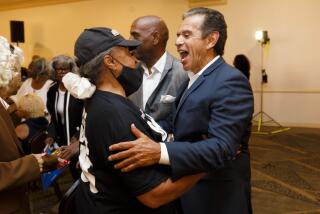How disappointing
Editorâs note: This piece launches Jim Newtonâs new weekly column examining the policy and politics of Southern California.
Mayor Antonio Villaraigosaâs inauguration, on a sunny Los Angeles morning 5 1/2 years ago, was a moment of celebration and promise. Villaraigosaâs personal future appeared limitless; the city seemed poised to reap great things. âWe need,â he said that day to 3,000 adoring supporters, âto start thinking big again.â
That feels like a long time ago.
Villaraigosa set out to take over Los Angeles schools, but fell short. He promised to plant a million trees, but didnât. He said he would promote job growth; jobs have fled. He pledged to secure 40% of the cityâs electrical power from renewable sources by 2020; the Department of Water and Power now is scaling back from that goal. He promised common-sense solutions to traffic; gridlock is worse than ever. Heâs presided over turnover and indirection on his personal staff, allowing key government positions to remain vacant for months.
Of course, the blame is not Villaraigosaâs alone. The mayor has been hampered by the economic downturn, which has exacerbated the cityâs budget woes. But increasingly, the administrationâs failings are being laid at his feet.
In recent weeks, as I have prepared to launch this weekly column, Iâve met with more than two dozen influential Angelenos â current and former politicians, labor leaders, environmentalists, neighborhood activists and bureaucrats â to hear about their concerns and enthusiasms. The conversations were candid and off the record. A diverse group of people, they shared one common sentiment: disappointment in the mayor.
Criticism from his longtime foes wasnât unexpected. They regard the mayor as selfish, arrogant and ineffective. But his longtime backers werenât much happier. They complain that heâs been an incompetent manager and has squandered the publicâs initial enthusiasm for him. They too are astounded at his preening self-indulgence.
Neighborhood activists think he is laborâs agent, determined to feather the nest of public employees in exchange for political support from unions. Labor representatives find him two-faced, reneging on deals and sloughing off basic management responsibilities. Environmentalists say heâs all talk. Conservatives deplore him; liberals are tired of him. Politicians believe heâs principally driven by his pursuit of higher office, but Jerry Brown beat him to the governorship and Dianne Feinstein shows no sign of leaving the Senate. And as those possibilities have not worked out, they say, Villaraigosa has simply lost interest. In the end, some speculate, he may have to settle for a seat on the county Board of Supervisors when Supervisor Gloria Molina departs.
âHeâs the invisible man,â one veteran of local government said last week. âHe has no impact.â
Asked about the mayorâs accomplishments, even his most vociferous critics acknowledge some successes. The Los Angeles Police Department, most noted, is healthier today than at any point in its recent history, and Villaraigosa gets â and deserves â much of the credit. Heâs helped expand the ranks, though heâs never quite fulfilled his promise to grow the department to more than 10,000 officers.
The mayorâs effectiveness has been hampered, in part, by staff turnover. Many of his most highly regarded deputies have decamped. Chief of Staff Robin Kramer left more than a year ago. Thomas Saenz was his counsel; heâs now at the Mexican American Legal Defense and Educational Fund. Transportation chief Rita Robinson moved to the county. Planning director Gail Goldberg came in a burst of promise, then left. Karen Sisson became the city administrative officer in 2006 and earned the confidence of labor and city leaders. She departed in 2008.
What remains is confusing: Chief of Staff Jeff Carr is well liked personally, but many question his depth of experience. Austin Beutner, the first deputy mayor and chief executive for economic and business policy, is beloved by the business community, but itâs hard to figure out exactly what he does. He and Villaraigosa circle each other warily, as Beutner contemplates his own run for mayor in 2012.
Villaraigosa is a deal maker. Heâs good at it. But itâs one thing to be able to make a deal; itâs another to know what deal to make. In lieu of a coherent plan, he flits. He pops up at a recycling rally. He dragoons LAPD commanders to stand around him to tout crime statistics. He appears in parades, visits with teachers, travels, issues statements. He vigorously supported the so-called 30/10 plan, a worthy effort to persuade the federal government to loan Los Angeles transportation money to accelerate projects. But success seems increasingly unlikely. Both the upcoming change in Congress and Villaraigosaâs wobbly reputation in Washington have undermined the effort.
One thing is clear: Villaraigosa knows his supporters are losing faith. He blames this newspaper, which has repeatedly endorsed him. He blames the City Council, which has approved every major proposal heâs sent its way. He whines when others get credit that he believes is due him. Council members say he expects obedience but does not even bother to tell them what to obey. Once a politician of unlimited potential, he now strikes many as alone and lost.
One of Villaraigosaâs most devoted friends cautioned against underestimating him, noting that the mayor has rebounded from personal and political setbacks before. Thatâs true and worth remembering. Villaraigosa has gifts of leadership and ability, and the time to take advantage of them. The city needs him to focus and deliver on his word.
More to Read
Get the L.A. Times Politics newsletter
Deeply reported insights into legislation, politics and policy from Sacramento, Washington and beyond. In your inbox three times per week.
You may occasionally receive promotional content from the Los Angeles Times.










